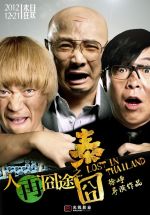|
Lost in Thailand

Year of release: 2012
Genre: comedy
Director: Xu Zheng
Action directors: Lee Chi-Git, Chan Sek
Producers: Abe Kwong, Xu Zheng
Writers: Ding Ding, Xu Zheng, Shu Huan
Cinematography: Song Xiao-Fei
Editing: Tu Yi-Ran
Music: Zhao Ying-Jun, Howie B
Stars: Xu Zheng, Wang Bao-Qiang, Huang Bo, Tao Hong, Xie Nan, Fan Bing-Bing
Not rated; contains IIA-level language and crude humor
Movie Review Index
Main Page
|
 
 
|
The first domestically-produced film to go over the one billion yuan (approximately US$160 million) mark at the Mainland box office, the 2012 comedy Lost in Thailand was originally promoted in the west as a Chinese version of The Hangover. After watching the movie, the more apt comparison would probably be Planes, Trains & Automobiles -- where two mismatched men go on an unintentional road trip.
The two men in this case are the straight-laced Xu Lang (Xu Zheng, who also directed, co-wrote, and co-produced the film) and goofball Wang Bao (Wang Bao-Qiang). Xu Lang is going to Thailand to try and beat his business partner, Gao Bo (Huang Bo), in getting their company's majority shareholder to sign off on the distribution of a new form of gasoline that will be worth trillions of dollars. Why exactly Xu and Gao are in competition with each other, instead of working together, is just one of this film's many nebulous story elements.
At any rate, Xu loses his passport, and so the overly enthusiastic Wang breaks off from his tour group to help Xu. Wang's "help" ends up getting the pair into an escalating series of mishaps, to the point where they are reduced to walking through the jungle. All of this is what could be a decent enough set up for a good comedy, but Lost in Thailand is missing the chemistry between the leads which is so crucial for movies like this to succeed.
Whether its' Planes' Steve Martin and John Candy, Midnight Run's Robert DeNiro and Charles Grodin, or (at least to a lesser extent) Due Date's Robert Downey Jr. and Zach Galifianakis, the central relationship is vital to how much the audience will become invested in the movie as a whole. Xu Zheng and Wang Bao-Qiang never quite click together, either as friends or antagonists; neither character truly reacts, instead playing off of the rules of a cliche-clogged checklist. One can see well in advance of trite and overused plot pieces: "okay, this is where Xu is going to turn into a fun guy for a scene before getting overly serious again".
It doesn't help that most of the comedy presented here simply isn't all that funny. This is not a matter of, say, jokes not translating to western audiences well ala Stephen Chow's "moy len tau" (nonsense comedy) style. Matters are more slightly amusing, rather than gut-busting. So, in the end, a jaded western (re)viewer might be prone to think that Lost in Thailand's domestic success was probably more due to local audiences being desperate to watch Mandarin productions that are not the same old historical martial arts epic over and over, and a savvy marketing campaign that used social media effectively, rather than this being a true standout in the comedy genre.
RATING: 5
Note: Lost in Thailand did go on to make 1.26 billion yuan (US$202 million) making it the number two all-time entry for box office take in the Mainland. As of this writing (May 2014) Avatar still holds the top spot, with profits of 1.39 billion yuan (US$223 million).
|
|




